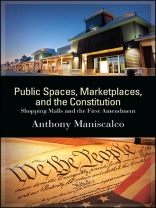In spite of their public attractions and millions of visitors, most shopping malls are now off-limits to free speech and expressive activity. The same may be said about many other public spaces and marketplaces in American cities and suburbs, leaving scholars and other observers to wonder where civic engagement is lawfully permitted in the United States. In
Public Spaces, Marketplaces, and the Constitution, Anthony Maniscalco draws on key legal decisions, social theory, and urban history to demonstrate that public spaces have been split apart from First Amendment protections, while the expression of political ideas has been excluded from privately owned, publicly accessible malls. Today, the traditional indoor suburban shopping mall, that icon of modern American capitalism and culture, is being replaced by outdoor retail centers. Yet the law and courts have been slow to catch up. Maniscalco argues that scholars, students, and the public must confront these innovations in commercial design and consumer practices, as well as what they portend for contemporary metropolitan America and its civic spaces.
Inhoudsopgave
Acknowledgments
Introduction
1. Built Environments and the Public Sphere
2. Public Space as Democratic Practice: A History
3. The Public Forum Doctrine versus Public Space
4. Closing the Commons in American Shopping Malls
5. Toward a Second Chance for the First Amendment in Third Spaces
Notes
References
Table of Cases
Index
Over de auteur
Anthony Maniscalco teaches at the City University of New York, where he is the Director of the Edward T. Rogowsky Internship Program in Government and Public Affairs.












